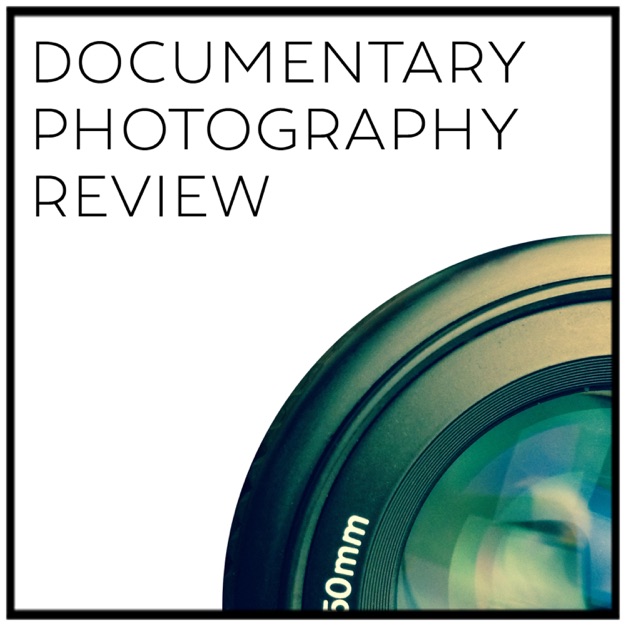
Documentary Photography Review Podcast
Chris King
In-depth interviews with documentary photographers from around the world who have documented stories local to them
- 27 minutes 39 secondsLaurence Watts - Visual Content Manager for Action Aid UK
In this episode of the Documentary Photography Review podcast I'm speaking to Laurence Watts – Visual Content Manager at the NGO Action Aid UK, responsible for commissioning stills imagery and video content for the organisation.
This is the first time I’ve interviewed someone who is not a photographer, and my intention is to explore more of what’s involved in being a current-day documentary photographer, beyond exploring stories and taking images – things like engaging with picture editors, getting funding, working with audio, and much more.
With Laurence I speak about what he looks for in a photographer when commissioning someone, the need to diversify your skills, how to get seen, and much more.
4 September 2015, 4:41 pm - 1 hour 5 minutesAn Interview with Agata Skowronek
In this episode I speak to Agata Skowronek – a photojournalist and video journalist from Germany, now based in Berlin having recently moved back there after spending the past 8 years based in Turkey, and working throughout the Middle East.
The interview is pretty long, but assure you it’s worth sticking it out, as Agata has a wealth of experience to share – from her recent collaboration and successful crowdfunding campaign with Simon Hipkins, who I interviewed in the last podcast, to her thoughts on the evolving landscape of photojournalism and how and why she intends to focus more time and energy on personal projects, and less on assignments – with a particular focus on the experiences of refugees and asylum-seekers from Syria and Iraq in Germany.
This is the first attempt to use Skype in a long time, but I learnt from my previous mistakes and instead of recording the Skype conversation itself, we both wore headphones and recorded our own voices. Agata then forwarded me on her recording, and I merged it with my own during post-processing. The result is good quality audio throughout the interview, which is great!
Now that I know this is a viable and effective method of conducting an interview, I will be reaching out to more photographers outside of the UK, which I’m really looking forward to doing, and have wanted to do for some time.
On top this, as of the next episode I will also start interviewing people other than photographers – such as picture editors, sound recordists and funders - more information on this at the end of the podcast, and be sure to subscribe via iTunes, Stitcher or SoundCloud so you don’t miss out.
Show notes as always are available on the Documentary Photography Review website at documentaryphotoreview.com/interviews and navigate to the page for this episode.15 August 2015, 11:14 pm - 55 minutes 28 secondsSimon Hipkins and The Circle
In this episode I’m speaking to documentary photographer and filmmaker Simon Hipkins.
Simon has worked professionally in photography and film for 15 years, and has worked as a director/producer, cameraman and editor for documentaries for the BBC and Channel Four.
In 2013 Simon was named as one of the winners of the Magenta Foundation’s Emerging Photographer Awards for his photostory on the town of Ostrava in the Czech Republic.
His recent multimedia project, The Circle, created in collaboration with another photographer and a sound artist on internally displaced people in Iraq was a finalist for the prestigious Dorothea Lange–Paul Taylor Prize.
In our conversation we talk about Simon’s experiences in creating the Circle – how they went about creating and presenting the work, as well as discussing how they are obtaining funding to sustain the project.
Simon and his collaborators have recently completed a successful crowdfunding campaign, and so we talk a bit about the strengths of this form of funding, and its role and benefits in getting unreported and under-reported stories a greater audience.
We cover a lot of topics, so there’s plenty for everyone, and show notes with more information on Simon, and links to the people and organisations we mention can be found at documentaryphotoreview.com/interviews.
1 August 2015, 6:38 pm - 49 minutes 35 secondsFreya Najade and Strawberries in Winter
In this episode of the Documentary Photography Review podcast I speak to photographer Freya Najade.
We talk about Freya’s work with a particular focus on her Strawberries in Winter project, which explores modern farming practices that ensure seasonal produce is available in European supermarkets all year round.
We also talk about the value of portfolio reviews and competitions when starting out as a documentary photographer, and doing so throughout your career in a strategic fashion.
I personally have never paid for a portfolio review myself, but I have to say Freya’s words have convinced me they are of real benefit, but agree that there is a real need to choose carefully and strategically when deciding who you obtain a review from, and to maximise the benefit gained for the money spent.
We also discuss the need to build a network to promote and support your evolution as a photographer – both offline and online, and benefits of doing so – from gaining feedback to helping to make a crowdfunding campaign a success.
Shownotes as always can be found at documentaryphotoreview.com/interviews and then navigate to the page for this podcast.
15 July 2015, 11:03 pm - 1 hour 4 minutesAnna Huix and Karakoram's Gemstone Hunters
In this episode of the Documentary Photography Review podcast I am talking to Anna Huix – a documentary and editorial photographer from Catalonia, but now living in London.
We talk about Anna’s experience of collaborating with journalists on documentary projects, and the struggles to get work published once completed, as well as her approach to portraits – both in her editorial work and documentary storytelling.
Anna has done a great job of finding her niche and developing her own style and approach to creating work.
One of the key things I got from the interview was the need to be open to random encounters, and the experiences that might unfold as a consequence. As you’ll hear a random encounter in a pub led Anna to Pakistan where she shot her gemstones project, which itself led to many other positive experiences and work.
Show notes can be found at http://www.documentaryphotoreview.com/photographers/interviews/podcast-anna-huix-and-karakorams-gemstone-hunters/
1 July 2015, 10:03 am - 1 hour 3 minutesAn Interview with Eduardo Leal
In this episode I am speaking with Eduardo Leal – is a Portuguese documentary photographer focusing on social and environmental issues across South America, along with politics and traditions within the region.
I first came across Eduardo’s work during a graduate exhibition at the London College of Communication, where his work Forcados was on display.
Since he graduated Eduardo has spent a lot of his time in South America, and has a particular attraction to life in Venezuela.
In the interview we discuss Eduardo’s work and his practices and how he goes about obtaining commissions.
1 June 2015, 6:52 pm - 45 minutes 8 secondsAdhytia Putra and The Price of Paper
In this episode I am speaking with Adhytia Putra, an Indonesian documentary photographer who has recently graduated from the London College of Communication with a Masters in Photojournalism and Documentary Photography.
During his time at the LCC, Adi created a body of work entitled ‘The Price of Paper’ – which explores the issue of deforestation in Indonesia – it’s causes and impact on the environment, the wildlife, and those who live in the communities affected by it. The complete body of work – made up of prints and a web documentary, will be exhibited at the final degree show from the 8th – 16th January at the LCC in London.
In the interview we discuss the story behind the Price of Paper, Adi’s experiences in exploring the subject of deforestation and it’s impact, as well as how he is going about getting it into the public domain, and much more.
Show notes for this episode can be found on the Documentary Photography Review website by going to http://www.documentaryphotoreview.com/episode15
1 January 2015, 4:23 pm - 46 minutes 57 secondsIesha Small and Mindshackles
This interview is with Iesha Small – a documentary photographer who picked up a camera just a few years ago, in order to help navigate her way through a particularly difficult time in her life.
In her project, entitled Mindshackles, Iesha has been exploring mental health – in particular documenting the experiences of those suffering from depression.
In the interview we discuss the Mindshackles project and the impact it’s having, as well as Iesha’s more recent venture into multimedia production.
Iesha has achieved a lot in a very short space of time - despite working fulltime as a teacher, having a young family, and being self-taught in photography.
To those who might be struggling to initiate their first project, Iesha’s work and all she has achieved is proof that, despite significant time and energy constraints, it can be done and done well. The key thing is finding the right story for you to explore – one that you can work on despite other commitments, and one you are passionate about. These two things will hopefully ensure you overcome any barriers – real or perceived, and see it through to its conclusion.
15 December 2014, 11:52 pm - 32 minutes 7 secondsIngrid Guyon on Participatory Photography Techniques
In this interview we talk to French photographer, educator and facilitator, Ingrid Guyon. Ingrid grew up in France and moved to London in 2001 to pursue her interest in photography and social anthropology. Ingrid’s passion and work lies in participatory photography and we talk at length about her work in this field and her rejection of other forms of photography, research and documentation, believing that those being photographed, written and talked about must have a voice. We talk about what participatory photography means to her, setting up Lambeth based organisation, Fotosynthesis, and the challenges of working in this field. We also talk about the shifts in photography since the digital revolution, and why she remains passionate about traditional photographic techniques and engaging people in these.
1 June 2014, 10:47 pm - 43 minutes 39 secondsCinzia D'Ambrosi and Transitional
In this podcast we talk to Cinzia D’Ambrosi about her photographic work Transitional, in which she documents people stuck in various forms of temporary, emergency, housing in London, Slough and Chichester. She tells us about her journey into documentary photography, starting as a painter and moving into photography after her first degree. She recently went back to do a Masters at the London College of Communication, where she was especially interested in understanding the ethical position of a documentary photographer. Cinzia has a very personal approach to her photography and tends to work on long terms projects; for Transitions she has spent over 2 years getting to know the residents, spending time talking with them and building relationships. She wanted to portray a set of images that breaks the stereotypes associated with the homeless or those in temporary accommodation. She chose a partially participatory approach to Transitional - working with the people she was photographing to choose the final edit of images, and leaving out any they were not happy with. Cinzia talks about the learning curve of self-publishing a Blurb book and her approach to visually laying out the story in book form.
18 May 2014, 4:36 pm - 2 minutes 39 secondsDocumentary Photography Review - The Video Podcast
In this episode, instead of Rebecca and I interviewing a documentary photographer as we normally do, I will be informing you of a new spin-off production.
I wanted to bring a more visual form to the interviews carried out for the podcast, and also to tap into other platforms such as YouTube and Vimeo, and so I have started to produce a video podcast of sorts to accompany the audio podcasts.
These will include a brief video introduction from the photographer themselves, after which they will go on to narrate a slideshow of their work.
I hope to produce video podcasts in tandem with the future audio podcasts – so you can watch a 5-10 minute introduction to the work, and then listen to a more in-depth audio interview to learn more about the project, the story being explored, and the photographer themselves.
Or of course you can always listen to the podcast first, and then visit the YouTube Channel to see the body of work for yourself, with narration from the photographer to give you insight into the stories behind each image.
Ultimately it will hopefully provide everyone with a more engaging experience, and an opportunity to learn more about the story and the photographer.
1 May 2014, 9:14 pm - More Episodes? Get the App
Your feedback is valuable to us. Should you encounter any bugs, glitches, lack of functionality or other problems, please email us on [email protected] or join Moon.FM Telegram Group where you can talk directly to the dev team who are happy to answer any queries.
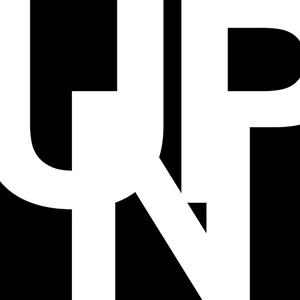 A Photographic Life
A Photographic Life
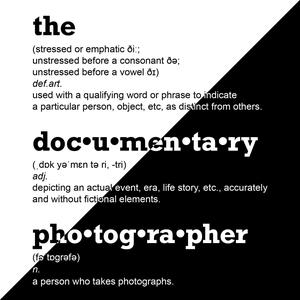 The Documentary Photographer Podcast
The Documentary Photographer Podcast
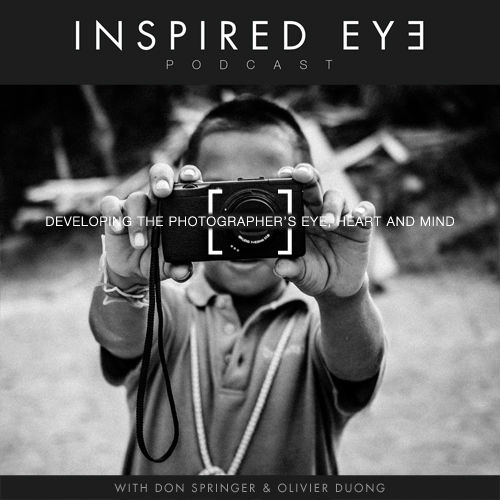 Photography Podcast | INSPIRED EYE
Photography Podcast | INSPIRED EYE
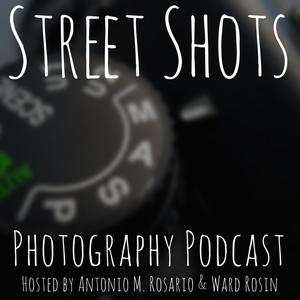 Street Shots Photography Podcast
Street Shots Photography Podcast